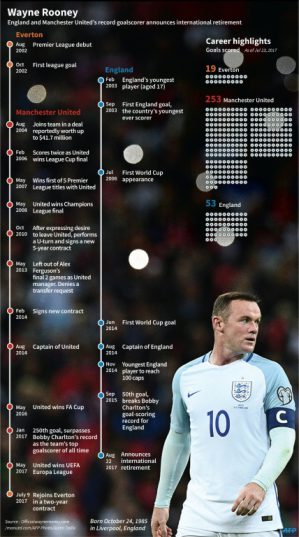While Wayne Rooney will never silence the cynics who carp about his lack of silverware in an England shirt, the astonishing array of records set by the striker ensure his place as one of his country's all-time greats.

Rooney’s announcement of his retirement from the international stage on Wednesday brought the curtain down on an England career that began in a blaze of hyperbole and ended with the Everton star rejecting Gareth Southgate’s offer of a return to the fold.
The 31-year-old’s 13-year England era featured glorious highs and shattering lows and left him as one of his country’s most polarising figures.
From the boy who grew up on the rough Liverpool streets of Croxteth to the man who won five Premier League titles and the Champions League with Manchester United, Rooney’s rise remains almost too perfect to be true and the England chapter of his tale is well worth reliving.
Rooney is England’s all-time leading scorer with 53 goals, more than Bobby Charlton, Gary Lineker and Jimmy Greaves could muster, while his 119 appearances make him his country’s most capped out-field player ahead of the likes of Bobby Moore and David Beckham.
The only blemish is his failure to transform England into a global force, but even Barcelona icon Lionel Messi has found replicating his sublime club form on the international scene harder than he might have imagined.

Profile of Wayne Rooney, England and Manchester United’s record goalscorer, who is retiring from international football
Forever etched in the memory as the teak tough street-fighter who would crunch into a tackle with as much relish as he took from scoring with a 30-yard rocket, Rooney burst onto the England scene as a 17-year-old in 2003.
His debut came in a 3-1 defeat against Australia at Upton Park and a first international goal followed against Macedonia.
The sight of Rooney tormenting the Switzerland and Croatia defences in Euro 2004 promised a golden future for the player and his country, but foreshadowing the angst to come a broke bone in his foot proved fatal to Sven Goran Eriksson’s team as they lost to Portugal in the quarter-finals.
Rooney went on to play in three World Cups and two further European Championships, showing boundless commitment to the England cause, even if his performances never hit the heights.
– Agonising –
At times that enthusiasm was to his detriment when he came back from injuries too quickly.
He famously announced before the 2006 World Cup that “the big man is back” when he joined up with his England team-mates — only to flop as he played at less than 100 percent before being sent off for stamping on Portugal’s Ricardo Carvalho as Eriksson’s men suffered one of a series of agonising quarter-final exits.
The 2010 World Cup in South Africa was supposed to be Rooney’s tournament after a fine campaign with United, but his most memorable contribution came at the end of a 0-0 draw against Algeria when he turned to the camera and criticised England supporters for booing their own side.
England were dismal at the 2014 World Cup and his last tournament ended in misery when Roy Hodgson’s team were humiliated by Iceland at Euro 2016.
Of Rooney’s seven goals at major tournaments, only one came at a World Cup, while four were when he was just 18.
Captaining England 29 times, Rooney’s last appearance came in a win against Scotland in November.
The great irony of Rooney’s decision to retire is it came at the moment when he looked capable of one last flourish after an impressive start for Everton following his close-season move back to his boyhood club.
Southgate was convinced enough to offer him another chance.
But Rooney, marching to his own drum until the end, preferred to focus on leading Everton to silverware instead.
Few would deny that England’s loss is Everton’s gain.
Support Local Journalism
Add The Citizen as a Preferred Source on Google and follow us on Google News to see more of our trusted reporting in Google News and Top Stories.






